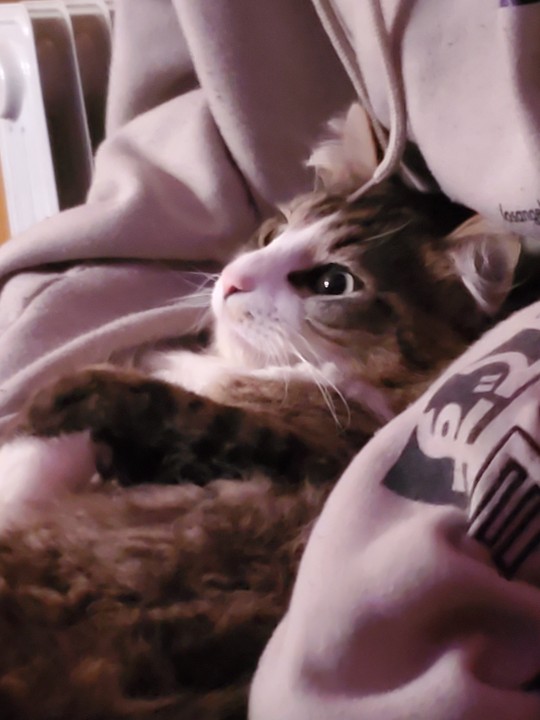#to new ppl*... it said the l could fit why must it lie to me
Note
I feel like Kim and Roxie would have a cat that's an absolute fucking bitch to everyone but them and I felt like you needed to know this
(I should be revising rn and I'm thinking about this bitchass roxipine cat the brainrot is real)
Oh my god... just like my cat for real.....
(The bastard herself; I tried to find photos where she looked upset/angry but there are. So fucking many photos of her to parse through I cannot understate.)





Anyway. Y e s. I am ascribing to this.
#in the photo where she's biting onto my jacket: she wasn't upset w me or anything she was just being a freak 😭#i love sappho she's so fucking baby. she HATES strangers (especially strangers that are men) so she is a bit of an avoidant bitch to new pp#i imagine their cat would be less avoidant and more Confrontational about other people#didnt attach the photo of her i could use as reference to this but i also picture their cat liking to Loom Above for when they need to +#+ Strike Someone....#like scott comes over for a friendly little visit and he passes by the stairs or a bookshelf or something before anyone can stop him and +#+ just. WHAM. Angry/displeased cat to the face#asks#cassmouse#ooc#txt#roxim#roxipine#kimrox#drumswords#sp comic#spvtw#spto#might throw more tags on this in a second i just realized i started answering this before i went to see which discord tag was right-- *runs#their cat would not look like mine btw. i dont think at least. i may return with the Ideal Cat#best of luck with revisions btw!! i remember you posting abt them i believe...#to new ppl*... it said the l could fit why must it lie to me#ACK. THIS SHOULD ALSO GO IN#headcanons#scott pilgrim headcanons
13 notes
·
View notes
Note
sorry if ppl may have already asked you this but, i've watched the movie recently and felt like a lot of intimate moments between clive and maurice aren't shown onscreen to us? had they been lovers until risley was arrested, the fight and clive's travel? did clive cheat on anne? they were probably seeing each other between 1910 and 1911, right? i'm sorry for the amount of questions but i'm rly curious djdj
Clive and Maurice never have physical intimacy. That’s one of the central points of the story – in E. M Forster’s novel and in James Ivory’s film. For three years, Maurice and Clive have a ‘platonic’ – i.e. sexless, non-physical – relationship.
This is a central reason why Clive is ultimately wrong for Maurice, and why Maurice finds happiness with Alec.
Even though Forster was writing in 1913-14, at a date when any hint of sex between men was illegal in the UK and punishable by imprisonment – and he wrote Maurice as a 35-year-old gay virgin who did not believe he would ever be able to have a physical relationship legally in his lifetime – he did a brave thing. He wrote a novel which shows that physical/sexual love between men is healthy and normal – not sick – and he gave his lovers who form a physical relationship, Maurice and Alec, a happy ending, without punishment.
Maurice is also a novel in which two contrasting 1910s attitudes to same-sex love between men are debated (lots has been written about this), and this is where Clive fits in.
Clive’s stated position (born out of self-repression and/or fear) is that same-sex love between men is only acceptable IF there is no sex. (Remember the film discussion on the punt in Cambridge, where Risley calls Clive ‘cold as a fish on a marble slab’?)
One key film scene where this is made really clear is when Maurice and Clive drive out into the Fens near Cambridge and lie down in the grass. It’s clear thar Maurice wants to take things further physically (check out James Wilby’s acting!) – but Clive will not even let Maurice kiss him properly on the mouth, and when Maurice tries to put a hand inside Clive’s shirt, Clive stops him. Clive says: ‘I think it would bring us down’.
Similarly, the point of the scene in the novel (= the deleted film scene titled ‘The night before Greece’), where Clive asks Maurice if he can climb into bed with him, is that this is torment for Maurice because Clive won’t permit anything physical, although it’s a torment that (after 3 years of this) Maurice has trained himself to accept:
"I'm cold and miserable generally. I can't sleep. I don't know why."
Maurice did not misunderstand [Clive]. He knew and [had convinced himself by now that he] shared [Clive’s] opinions on this point. They lay side by side without touching. Presently Clive said, "It's no better here. I shall go." Maurice was not sorry, for he could not get to sleep either, though for a different reason, and he was afraid Clive might hear the drumming of his heart, and guess what it was. (Maurice, end of Ch 21)
Incidentally, in a letter to Forster written as early as 1915, Lytton Strachey (one of the trusted friends to whom Forster had lent an early draft of Maurice to read) questioned why Maurice puts up with this from Clive. “He [Maurice] was a strong healthy youth ... how the Dickens could Clive restrain him?”
Forster implies that Clive’s marriage to Anne, too, is more or less sexless, and certainly passionless:
So much could never be mentioned. He never saw her naked, nor she him. They ignored the reproductive and the digestive functions. (Maurice, end of Ch 33)
And, in the closing scenes, when Maurice returns to Penge/Pendersleigh by night to tell Clive his news about Alec before disappearing for ever from Clive’s life, Clive’s entire reaction is to treat physical sex between men as wrong. Clive recoils from the joy Maurice (and Forster) can’t resist sharing:
"I have shared with Alec," [Maurice] said after deep thought.
"Shared what?"
"All I have. Which includes my body."
Clive sprang up with a whimper of disgust. ... [H]is thin, sour disapproval, his dogmatism, the stupidity of his heart, revolted Maurice, who could only have respected hatred.
"I put it offensively," [Maurice] went on, "but I must make sure you understand. Alec slept with me in the Russet Room that night when you and Anne were away."
"Maurice—oh, good God!"
"Also in town. Also—" here he stopped.
Even in his nausea Clive turned to a generalization – it was part of the mental vagueness induced by his marriage. "But surely—the sole excuse for any relationship between men is that it remain purely platonic."
"I don't know. I've come to tell you what I did."
(Maurice, Ch 46)
82 notes
·
View notes